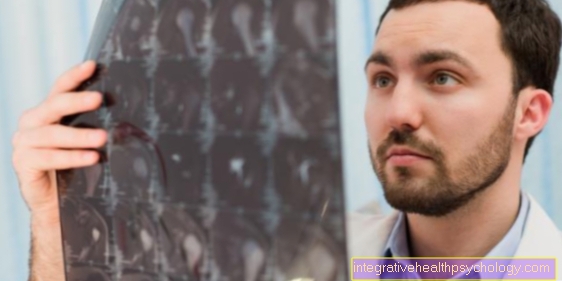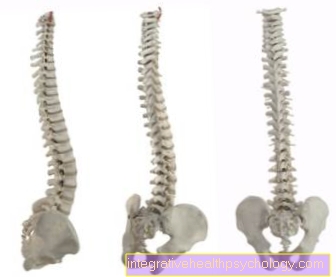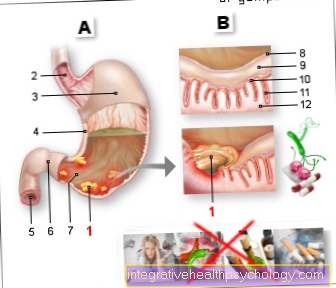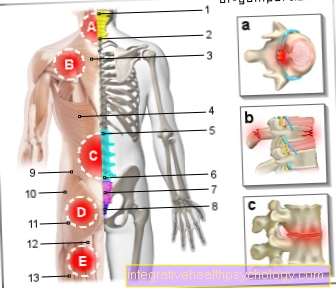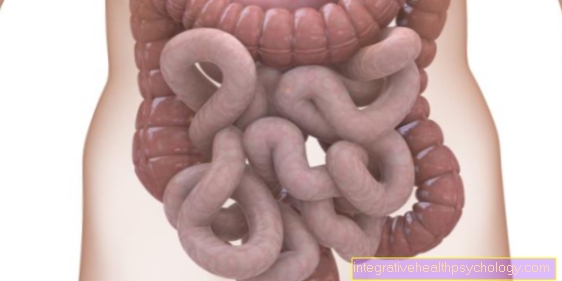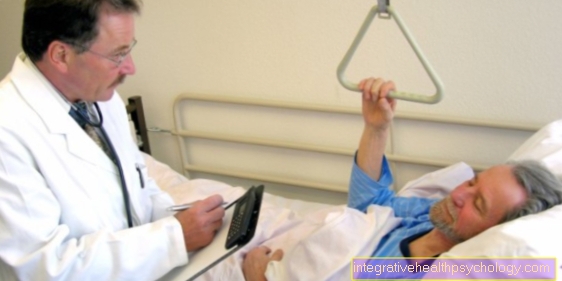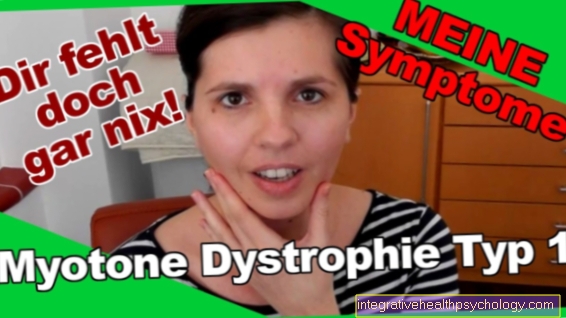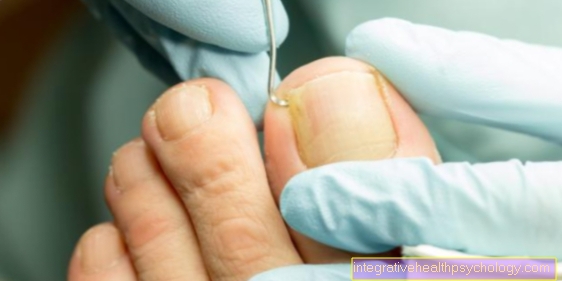Medication for a herniated disc
For drug treatment in one disc prolapse come above all
- pain reliever drugs (Analgesics)
- but also drugs with anti-inflammatory (anti-inflammatory) drugs
and - anti-cramping (muscle relaxing) ingredients
used.
Many of them are available from pharmacies without a prescription.
Over-the-counter drugs
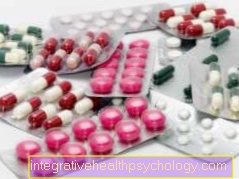
So-called non-steroidal anti-inflammatory drugs (NSAIDs). This group of drugs includes common products like ibuprofen, diclofenac, and naproxen. They work above all pain reliever and anti-inflammatory. It should be noted with this group of drugs that they can lead to gastrointestinal ulcers and that Risk of bleeding increase as they affect blood clotting. If there are contraindications to NSAIDs, paracetamol, which does not belong to this drug group, can be used. Paracetamol is better tolerated in comparison. With paracetamol, however, it is important to keep to the maximum dose of four grams per day (corresponds to 8 tablets, 500mg each), as otherwise life-threatening liver damage can occur.
Prescription drugs
Also Muscle relaxantsthat lead to a relaxation of the muscles are used to treat the herniated disc. Ingestion often leads to tiredness and slight drowsiness, which can impair driving ability.
Also Opioids Doctors may prescribe treatment (strong pain relievers) for treatment.
Sometimes they are also in the form of a Pain plaster prescribed. Opioids come in stronger and weaker forms. The most famous opioid, Morphine, has a very strong analgesic effect.
If it is used purely to combat pain, there is no need to fear addiction. However, they should not be used on drug addicts. Therefore, stronger opioids can only be used on one Narcotics prescription (BTM prescription) be prescribed.
Opioids can cause respiratory depression, nausea, dizziness, constipation as well as other things Mood swings to lead.
Also drugs that are normally used to treat the epilepsy are used, are used for herniated discs because they are also used for Treatment of nerve pain allowed are. Like muscle relaxants, they too lead to tiredness and slight impaired consciousness.
As well as anti-epileptic drugs you can too Antidepressants can be used. More precisely, find here the so-called tricyclic antidepressants, such as Amitriptyline their application. They are mainly used to treat chronic pain used when traditional pain relievers are no longer effective.
These antidepressants can set the pain threshold high so that pain is only felt later. As side effects it can be too nausea, Dry mouth, low blood pressure, Cardiac arrhythmias as well as fatigue come. The last two drug groups, anticonvulsants and antidepressants, are only used for long-lasting pain when conventional painkillers no longer work.
Appointment with a specialist for a herniated disc?

I would be happy to advise you!
Who am I?
My name is dr. Nicolas Gumpert. I am a specialist in orthopedics and the founder of .
Various television programs and print media report regularly about my work. On HR television you can see me every 6 weeks live on "Hallo Hessen".
But now enough is indicated ;-)
A herniated disc is difficult to treat. On the one hand it is exposed to high mechanical loads, on the other hand it has great mobility.
Therefore, treating a herniated disc requires a lot of experience.
The aim of any treatment is treatment without surgery.
Which therapy achieves the best results in the long term can only be determined after looking at all of the information (Examination, X-ray, ultrasound, MRI, etc.) be assessed.
You can find me in:
- Lumedis - your orthopedic surgeon
Kaiserstrasse 14
60311 Frankfurt am Main
Directly to the online appointment arrangement
Unfortunately, it is currently only possible to make an appointment with private health insurers. I hope for your understanding!
Further information about myself can be found at Dr. Nicolas Gumpert
Alternative pain management - PRT / PDI
If the pain cannot be treated with medication, another conservative measure can be used before surgery is chosen.
This is the periradicular therapy (PRT) or peridural infiltration (PDI). In these procedures, under imaging control (computed tomography, CT) analgesic, anti-inflammatory and tissue-sclerosing drugs can be injected into the painful nerve root. This is done with millimeter precision.
One uses a for injection Corticoid (Kortisone preparation), which belongs to the group of Glucocorticoids counts, these work anti-inflammatory and growth inhibiting. The drug is used in the case of peridural infiltration in the so-called Epidural space injected which the Spinal cord surrounds. The nerve roots are also located in the epidural space.
In the case of peridural injection, 68% of patients experience an improvement in symptoms or even complete freedom from pain. In the case of acute pain in particular, peridural injection often provides relief compared to other conservative treatment options. An injection should not be carried out if the patient has an increased tendency to bleed, or if tumor diseases have been diagnosed and inflammatory processes are taking place in the area of the vertebral bodies.
In the periradicular therapy Medicines are also injected using computer tomography. This is usually a periradicular therapy Local anesthetic and a cortisone supplement.
The aim of therapy is to use the anti-inflammatory drug (cortisone) as close as possible to the painful and swollen nerve root. Cortisone has a decongestant effect, so that the nerve swelling goes back and the pressure and thus the pain (also increased by the local anesthetic) go back.
The Symptoms of the herniated disc usually improve within a few days under periradicular therapy (PRT). A PRT usually has to be repeated twice. Decisive for this is the decrease in symptoms.
Contraindicated both procedures are at Pregnant women.
Manual therapies like Massages and physical therapies with the use of Warmth, cold or Infrared radiation, can relieve pain in a herniated disc. Many patients also find the use of acupuncture treatments helpful.
Medication for a herniated disc during pregnancy
Especially in the pregnancy the risk of a herniated disc is higher, as during pregnancy the Ligaments and joints softer become. Due to hormonal changes, more water is stored in the intervertebral discs during pregnancy, making the intervertebral discs more unstable and easier to jump out of their anchoring.
Many drugs are contraindicated in pregnancy and should be avoided. Especially Operations pose a danger to the unborn child.
That is why one often chooses during pregnancy alternative treatment options like acupuncture, Heat therapy and physical therapy. Straight acupuncture often gives the pregnant woman a great deal of pain relief.
The pain medication of choice during pregnancy Paracetamol such as Ibuprofen. They can be taken largely safely up to the 28th week of pregnancy.
After the 28th week of pregnancy, there is a risk of ibuprofen having negative effects on the cardiovascular system of the unborn child.
Also aspirin can be used to treat pain. However, this also only up to the 28th week of pregnancy because of possible effects on the cardiovascular system. It is often prescribed by the doctor in doses lower than usual. Aspirin is the second choice in pain relievers during pregnancy.
The use of paracetamol is classified as harmless, but you should adhere to the recommended dosages and only take the drug occasionally if there is painful indication. If this is followed, it is usually the first choice for the treatment of pain and fever. Compared to other painkillers, paracetamol can also be used to treat pain in the last trimester of pregnancy, after the 28th week of pregnancy.
In general, NSAIDs in the last trimester of pregnancy (including aspirin and ibuprofen) be avoided should.




